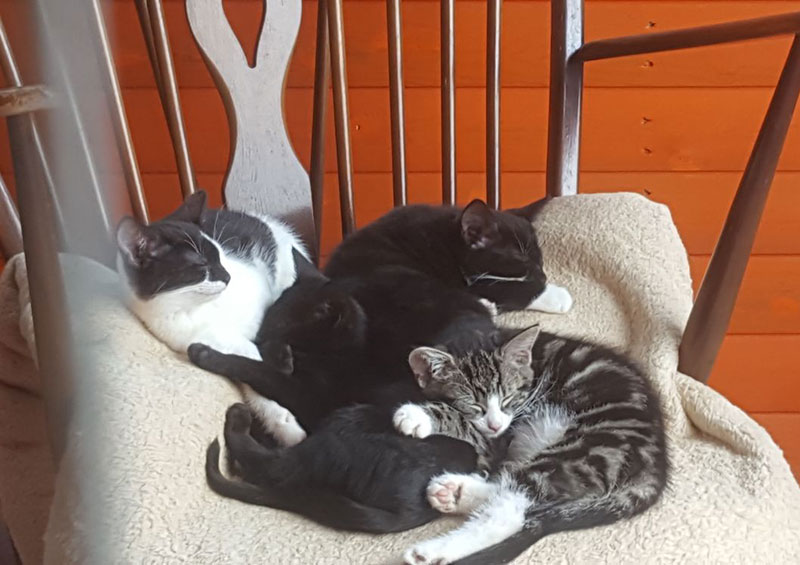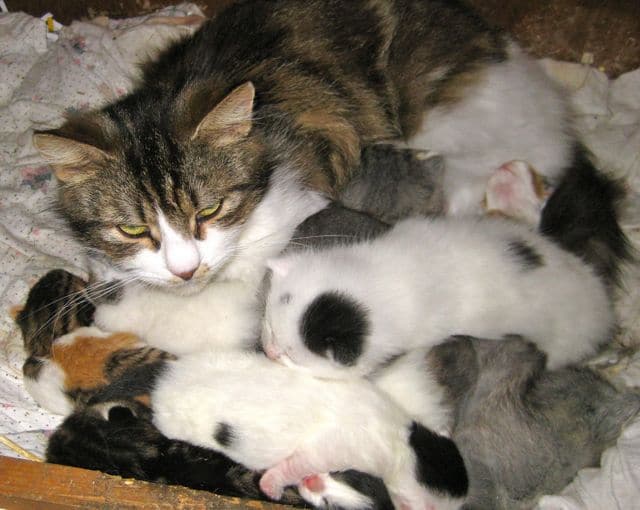Sanctuary Life
Caring for a pregnant cat
Cats are in kitten for about nine weeks – at 28 days into their pregnancy the kitten embryo is still only one inch long, most of the development takes place in the last three weeks before birth.
A pregnant cat needs a higher standard of nutrition and we feed to take account of this. She may develop a big appetite and eat more than normal or some cats just become very choosy about their meals. We go along with this – just like humans, (perhaps more so!) cats have their likes and dislikes. It’s nature telling them what’s best for them.
We provide biscuits ad lib just the same as with all the cats – the only difference being that our pregnant ladies have Kitten biscuits which are a higher standard than the normal maintenance ration. We make these available throughout pregnancy and while the cat is feeding her babies. Our make of choice is Royal Canin or Hill’s Science Diet. Cheaper varieties sometimes give tummy upsets and you can see the difference in condition in a cat feed on premium food.

Kitten pouches are alright but we give our pregnant ladies give a variety of fresh food which is our preference. Fresh mince or any chopped meat, either cooked or raw. Your cat will tell you which she likes best. Also fish is on offer, only the cheaper and sustainable varieties are given – sardines, mackerel, coley etc. We feed to appetite, small meals and often and have never known a pregnant cat to overeat, they normally snack on what they need. Bear in mind that if you are feeding bought in cat food it is convenience food, not fresh and has been made in a factory. You do not know exactly what the ingredients and additives are or how old it is.
Cats have thrived for thousands of years on natural food – they have managed without canned and pouched and dry food perfectly well and in our experience were healthier when they had ‘fish bits’ from the fishmonger and meat scraps from the butcher. As well as food they caught for themselves. Today’s cats seem to spend a lot of time at the vets.
We give a few drops of salmon oil unless we are already feeding a lot of oily fish. A small dish of goat’s milk is often well liked but never give cow’s milk which is difficult for cats to digest. Goat’s milk yoghurt is very popular with our pregnant and nursing cats, put a couple of spoonfuls on a saucer and watch them lick it up. More please! A few cooked mashed up carrots and peas are often liked too, as is scrambled egg. When you’re having one yourself put a spoonful out for the cat and see if she likes it. If your cat is having a varied diet then vitamin supplements should not be necessary. If you are unsure about your cat’s condition then it’s always best to consult a vet.
The maternity room is something to sort out early on. Finding the right place for Miss Puss to have her kittens is a challenge. She will want somewhere nice and quiet and with a lot of privacy. A big cardboard box is ideal, preferably with a partial lid on it so that she has her own ‘den’. We put plenty of paper in and then some sheets if it’s warm or fleeces if it’s chilly. We encourage the cats to go in their ‘nest’ and they usually get the hang of it right away. So long as no other cats have access, they will make it their place to have the kittens. A bit of catnip sprinkled round the edges helps to make it a desirable des-res. We always put a dish of catnip anyway. Cats love it and it’s a tonic for them.
Check with your vet about worming . Some wormers are not advised for use in pregnancy so you will need to get the right ones and worm at the right time. Consult your vet. It goes without saying that you need to make sure your cat doesn’t have fleas before she goes into her maternity unit. Again, check with the vet what is safe to use. Or you can just comb the fleas out which is time consuming (use a flea comb and have a dish of water ready to drown the critturs) but it is safe with no chemicals and possible side effects.
You will know if your cat has fleas if you let her sit on a white sheet. If there are black spots on it then she is infested. These will be flea eggs. Get treatment for her right away.
You’ll know she is going to give birth when she becomes restless, starts to pant and bear down. We leave our mommy cats to get on with it on their own, only a discreet check to see all is well from time to time. Do not let strangers near your cat when she is giving birth, it may upset her and things could go wrong. A cat usually takes several hours to have her kits. and it usual for her to have between two and six. She will not usually want to eat or drink until it’s all over.


